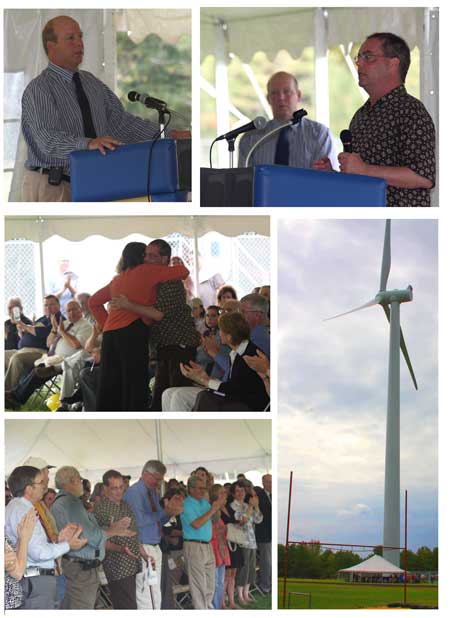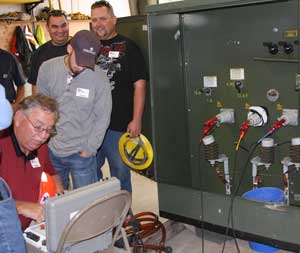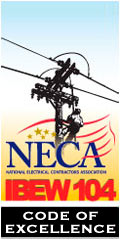NEPPA eNewsletter
October 2010
Sharon Staz, general manager and treasurer of the Kennebunk Light and Power District in southern Maine, realized a childhood dream this summer. She was selected by the American Public Power Association (APPA) to represent U.S. consumer-owned electric utilities on a tour of Japan, where she was able to briefly immerse herself in Japanese culture and history while learning about the growing importance of solar power in the country’s energy mix.
The trip, organized by the Solar Electric Power Association (SEPA), was the third such tour of countries whose governments are making major commitments to solar power development through financial and tax incentives, feed-in tariffs and support of research on new solar technologies. Previous tours took similar groups to Germany and Spain.
The group assembled to visit Japan included 23 participants representing public, private and cooperative U.S. utilities, the federal Department of Energy, research organizations and trade groups, along with staff from SEPA. During their week in Japan, they visited government agencies, research centers and universities and private companies involved in solar energy projects in Tokyo, Osaka and Kyoto.
Electricity costs are very high in Japan due to a need to import all the coal and oil to fuel generating plants. Government policy, therefore, seeks to transition away from imported fossil fuels for electric generation and move to more nuclear and renewable energy sources. A very aggressive goal of reaching 28 gigawatts of solar power by the year 2020 has been established by the government, with most of this coming in the form of small rooftop installations on residential and commercial buildings. To achieve this, a variety of financial incentives have been implemented and some of the nation’s largest commercial and business enterprises have already made major investments in new solar projects.
For Sharon Staz, the trip fulfilled a lifetime dream of visiting Japan. Fascinated since her early childhood by Japanese culture, she was honored and thrilled when she received the invitation to represent APPA on the tour. While she was her usual diligent self in attending and participating in all official tour briefings and visits, she also took some personal time to visit historical sites, observe Japanese customs and lifestyles and do some shopping away from the big malls and tourist stops. She was very impressed by the work ethic demonstrated by the Japanese, whom she often found at offices late into the evening. She was also fascinated by the country’s advanced high-speed rail system, as well as practical use of space evidenced in houses and apartments much smaller than American residences. It is common, she said, for families to use a single room as a combination bedroom, family room and storage area during a single day.
As general manager of a small American utility which works hard to keep electric rates low for its customers, she also found Japanese utility officials have a longer view of costs and benefits in planning for the future. There appears to be, she said, a greater willingness to invest in new and cleaner technologies despite their higher cost, since Japanese society as a whole will benefit from these investments.
Looking back on her Japanese experience, Sharon is personally and professionally gratified. She is also enthused about bringing more solar energy to her own utility, if she can marshall the technical, financial and political support required. Having seen what can be done when government policies and private investments work toward the same goals, she now knows what is possible. The United States and its electric utilities, she said, have much to learn from the "Land of the Rising Sun."

##SHARELINKS##
|
EXECUTIVE DIRECTOR'S REPORT
On Nov. 5, at the beautiful and historic Mechanics Hall in Worcester, Mass., NEPPA will celebrate its 45th birthday. The setting for this celebration will be the association’s annual membership meeting , where we will envision plans for the future while briefly looking back at 1965, the year in which our "founding fathers" established the Northeast Public Power Association.
It was, in fact, an eventful year for electric utilities in New England due to the great "Northeast Blackout" of Nov. 9, which left more than 30 million people in Canada and the United States in the dark for up to 12 hours. In response to that event, fundamental changes in the structure and operation of the electric utility industry were undertaken, leading to the creation of regional reliability councils throughout the country and development of a consolidated power pool in New England.
As an association, NEPPA has also experienced fundamental changes over the past 45 years. Originally founded to help lobby for the development of a federal hydropower dam on the St. John River in Maine, it has evolved into a professional association providing a wide range of training, educational and information services to its members. With 73 public power utilities and more than 100 affiliate private companies in its membership, it serves as an important regional network linking industry officials, vendors and service providers throughout the six New England states. It also represents the interests of its members and their customers before the U.S. Congress and the executive branch of the federal government.
We invite each and every member of NEPPA to join us Nov. 5 in Worcester. We will update you on plans for the future and provide an opportunity for affiliate members to tell us about their companies, their services and products. We will also recognize members who are celebrating their own anniversaries.
If you come, you will see one of New England’s most famous and historical buildings and walk the same floors Mark Twain, Charles Dickens and Teddy Roosevelt once did. The only thing we ask is that you register in advance so we can assure adequate seating and food for everyone.
We look forward to seeing you all at Mechanics Hall on Nov. 5. We will be honored to have you join us.

##SHARELINKS##
|
AROUND NEW ENGLAND
On Sept. 19, Templeton's 1.65-megawatt wind turbine was named the John R.S. LeClerc Wind Turbine in honor of Narragansett Regional Middle School technology teacher John LeClerc, who started the project as a way of teaching his classes about renewable energy. The 383-foot-high wind turbine with 122-foot-long blades is located near a running track behind Narragansett Regional Middle-High School.
At least 150 people attended the dedication facilitated by Templeton Light and Water Department General Manager Sean Hamilton and applauded by state and local officials.
State Sen. Stephen M. Brewer, D-Barre, discussed the long winding road that LeClerc, who is battling brain cancer, has taken to achieve his goals and praised him as a visionary and a teacher who has changed the way many look at energy.
"The exciting part of this project is as an example of a small town taking the bull by the horns and leading the way for others to follow," said Lt. Gov. Timothy P. Murray. "It was a tech ed teacher that taught his class and industry to come together and complete the project."
Six years ago, LeClerc and Hamilton formed the Green Energy Educational Collaborative and obtained grants for equipment to study wind power. School Superintendent Roseli Weiss said LeClerc was an example of a teacher who met the needs of students, who will continue to learn about green energy by studying the turbine.
LeClerc called Hamilton a workhorse.
"Sean is relentless and will do whatever it takes, however it takes, to do something for the kids," he said.
The resulting turbine is expected to eventually generate 3.5 kilowatts per year to help lower the cost of energy to the school and the town.
(clockwise) Templeton Light and Water Department General Manager Sean Hamilton facilitates dedication of the wind turbine and John LeClerc accepts the honor of having it named after him. School Superintendent Roseli Weiss, along with nearly 150 attendees, congratulate and applaud LeClerc.

##SHARELINKS##
|
For the third year, Braintree residents have named BELD Broadband the "Best of Greater Braintree" of 2010 in the Internet Provider category. The town also voted the department Best Cable TV Provider for the second year and best phone service, casting votes via bestofsurveys.com with Market Surveys of America, an independent survey company and member of the Better Business Bureau.
"We’re delighted that our friends and neighbors took the time to cast votes and make BELD Broadband ‘Best of Braintree’ again this year," said Municipal Light Board Chairman Tony Agnitti, during a recent meeting with Vice Chair Jim Regan and Secretary Tom Reynolds.
In an effort to continue bringing quality service to its customers, BELD Broadband is adding more sports content, including Boston Celtics away games in high definition (HD).
##SHARELINKS##
|
The National Safety Council (NSC) has awarded the Massachusetts Municipal Wholesale Electric Company (MMWEC) its "Perfect Record Award" for six years without a lost-time accident at its Stony Brook Power Plant in Ludlow, Mass.
The NSC award recognizes the MMWEC organization's long-standing commitment to safety in operating and maintaining its Stony Brook facilities, which include 527 megawatts of electric generating equipment, a natural gas pipeline, oil storage tanks, electric transmission lines and other facilities.
"The award is particularly significant due to the level of activity at the plant in recent years," said MMWEC Chief Executive Officer Ronald C. DeCurzio. "It's extremely important to keep the plant in top operating condition, and there have been several major equipment upgrades where the exposure to safety issues has been high," he said.
The NSC safety award, presented to employees by MMWEC President Peter D. Dion, cites MMWEC for operating the plant "437,400 employee hours without occupational injury or illness" from April 2004 to April 2010. Stony Brook remains accident-free to date. The NSC works with businesses, elected officials and the public to ensure safety and prevent injuries in the workplace, on roads, in homes and communities.
Safe operation of the Stony Brook plant earned MMWEC a Safety Award of Excellence from the American Public Power Association earlier this year.
The existing Stony Brook plant, commissioned in 1980, provides electric energy and capacity to 25 Massachusetts municipal utilities based in the communities of Ashburnham, Boylston, Danvers, Georgetown, Groton, Hingham, Holden, Holyoke, Hull, Ipswich, Littleton, Mansfield, Marblehead, Middleborough, Middleton, North Attleborough, Paxton, Peabody, Reading, Shrewsbury, Sterling, Templeton, Wakefield, West Boylston and Westfield as well as six Vermont utilities.
MMWEC is pursuing plans to build a new 280-megawatt power plant at its Stony Brook site to help meet the future needs of its Member and other municipal utilities. MMWEC is a non-profit, public corporation and political subdivision of the Commonwealth of Massachusetts that provides a variety of power supply, financial, risk management and other services to the state's consumer-owned, municipal utilities.
##SHARELINKS##
|
ASSOCIATION HAPPENINGS
More than 40 public power officials from New England attended the NEPPA Business Forum on Sept. 24 at the Chocksett Inn in Sterling, Mass. The meeting highlighted important business topics for public power systems, including electronic billing and payment systems, data security and freedom of information challenges and dealing with the growing problem of utility customer bankruptcies. Presentations on each topic were made by industry experts, followed by extensive discussions of specific cases and circumstances.
Peter Castiglia and Bill Gambon of Century Bank discussed their company’s lockbox and collections systems and the use of credit cards and other online payment systems by utilities. Mark Altman of Mark Altman & Associates described the advantages of electronic bill presentment and payment systems.
Attorney Lauren Goldberg of Kopelman & Paige explained the intricacies of public records laws for municipal utilities and the growing responsibilities of public and private companies alike for data privacy protection.
The final speaker of the day was attorney David Fixler of Rubin & Rudman, who provided a roadmap for public utilities faced with bankruptcy filings by customers. He explained different types of bankruptcies under the federal bankruptcy code and the various steps utilities can take once a customer has made a bankruptcy filing under chapters 7, 11 or 13 of the bankruptcy code.
Before adjourning, the group also discussed future roundtable topics, including collections and a more in-depth review of different bankruptcy proceedings. Plans will be under way soon to schedule the next business roundtable.
Copies of each presenter’s slides are available on the NEPPA website. Click here.
##SHARELINKS##
|
NEPPA's unique professional development program, the Public Utility Management Program, has been planned for 2011. It is an intensive one-week program (divided into spring and fall sessions) in which participants learn or improve critical leadership skills, apply practical management techniques and strengthen their understanding of the most important developments affecting the electric utility industry in the United States. In 18 years since the program was first offered to NEPPA members, more than 350 public power professionals throughout New England and all areas of utility operations have completed it and received a NEPPA certificate in Public Utility Management.
Program objectives for 2011 are providing an in-depth review of eight essential management skills for public power leaders, as defined by experienced utility managers in the field. In the March session, topics will include self-motivation and personal initiative, critical thinking and learning, business and financial skills and people skills. The November session covers classes on communications, negotiation and persuasion, strategic planning and political skills. Each class will be led by professionals with extensive experience in their topics.
The spring session will be held March 23-25 and the fall session Nov.16-18 at the Cranwell Conference Center in Lenox, Mass.
Watch your mail for details or go to the NEPPA website - www.neppa.org.
##SHARELINKS##
|
CALENDAR
|
Oct. 7
Fundamentals of Utility Accounting
8:30 a.m. – 2:30 p.m
Chocksett Inn
Sterling, Mass.
Oct. 13-14
Crew Leadership
9 a.m. – 3 p.m.
Chocksett Inn
Sterling, Mass.
Oct. 27
Smart Grid Workshop
9 a.m. – 2 p.m.
Devens Common Center
Devens, Mass. |
Nov. 5
Annual Membership Meeting
Mechanics Hall
Worcester, Mass.
Nov. 9
HR Roundtable
9 – noon
Chocksett Inn
Sterling, Mass. |
##SHARELINKS##
|
EDUCATION & TRAINING UPDATE
You have probably already received it in the mail: NEPPA’s Safety & Technical Programs 2011 booklet, which includes course descriptions and registration forms for NEPPA’s technical training offerings for the coming year. The booklet reflects a significant increase in the number of learning opportunities NEPPA is making available to its members in the coming year.
The booklet is divided into four sections: On-Site Classes, Technical Training Programs, Additional Programs and Registration Forms. In the first section, 13 new four-hour technical courses have been added to our safety program, giving operations personnel a greater variety of courses to choose from.
As far as the longer technical training programs are concerned, our signature course - the Apprentice Lineworker Program - is joined by three new programs, Substation Technician II (a follow-up to this year’s Substation Technician I), Basic Metering and Advanced Metering. The last two came about in response to many requests for meter training during the past two years.
In addition to safety and technical training, we are presenting a number of additional programs next year. Two services Safety Director Dave Fabrizius now conducts - on-site Safety Audits and Electrical Safety for First Responders - will continue, and three programs will be introduced, OSHA 1910.269 Review, CDL Class A License Training and Reading Electrical Prints and Schematics. Two other courses, Bucket Truck Training and Chain Saw Safety, have been updated and will be taught by outside consultants.
The booklet concludes with a series of registration forms aimed at making it easy to sign up for the various classes and programs. If you have any questions about NEPPA training in 2011, please contact Sharon Davies at 508-482-5906 or sdavies@neppa.org.
Steve Socoby, NEPPA technical trainer, conducts a class in substation maintenance at Norwich Utilities in Norwich, Conn. This is just one of the technical programs NEPPA offers its members.

##SHARELINKS##
|
LEGISLATIVE UPDATE
Click here to access full articles
Congress Adjourns to Campaign for Elections, Leaving Long "To Do" List for Lame Duck
Obama Says Energy is a Top Priority Next Session; Senate Open to Advancing "Targeted" Energy Bills in 112th
McDermott & Cantwell Introduce CREB Reform Bills
Graham Introduces New Version of RES: A Clean Energy Standard
EPA Delay Vote Punted to Next Year
House Passes Bill Enabling Utilities to Provide Energy Efficiency Loans for Homeowners
Gas Pipeline Bills Proliferate; Expedited Senate Hearing Held on Legislation
Energy Committee's Top Republican Loses Alaska's Republican Primary, Mounts Independent Bid
Dodd-Frank Financial Services Bill at Commodity Futures Trading Commission (CFTC)
FERC Extends Comment on Transmission Planning and Cost Allocation
##SHARELINKS##
|
THE LEARNING CORNER
I was recently in Johnson, Vt. conducting a class on "Dealing with the Public" for lineworkers from five surrounding towns. When the class ended and the room was empty, I was unplugging my computer and packing away notes when I happened to look out the window.
There in the parking lot were the majority of my students. They were clumped together in groups of two or three, in some cases five, talking for at least 15 minutes before getting in their trucks and driving away. One phrase came to my mind and I said it out loud: "Communities of Practice."
If you have read my previous newsletter articles, you know I say repeatedly that learning is not restricted to schools or training courses, nor is it always organized and led by a teacher or expert. Learning takes place anywhere and anytime, and nowhere is this more true than with communities of practice (CP). Consider these three points:
Communities of practice is "social learning."
The main thrust of CP is that people are inherently social. We need to interact with others and we are quick to form groups. We do this for a variety of reasons—to report on experiences, exchange information, seek advice—all of which lead to an increase in knowledge. When we share tips and techniques for doing a job or discuss ideas for solving a problem, we are learning from others.
Communities of practice is informal learning.
The learning doesn’t have to be formal or even planned. When two or three persons gather around the water cooler, they are probably discussing a common business issue (unless they’re bemoaning the Red Sox season). A police chief once told me that when you see two cruisers parked side by side, chances are the officers are updating each other on a recent crime or reviewing goings-on in the neighborhood that bear watching. In both these examples, the learning is informal or spontaneous, and for that reason managers should not be too quick to break up the conversation. As Thomas Davenport and Laurence Prusak mention in their book, Working Knowledge, "Managers shouldn’t underestimate the value of talk."
Communities of practice takes place everywhere.
Although it’s easy to assume our learning is somehow separate from our daily lives, CP reminds us we learn as part of everyday experiences—in the playground, on the athletic fields, in the office and at home. It reminds us, too, that we are constantly changing roles in the process. Sometimes we’re learners, sometimes teachers and sometimes observers.
Etienne Wenger, a leading authority on communities of practice, has written, "If you’re serious about knowledge, you have to be serious about communities." I like to think the lineworkers in Johnson who attended my training session learned something in class. But I’m also betting that by the time they drove away that day, they had done some serious learning outside of the classroom.
Who is in your community? Who do you learn from?
##SHARELINKS##
|




|
|







